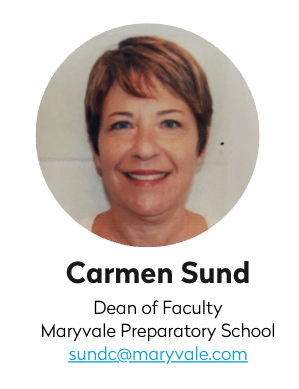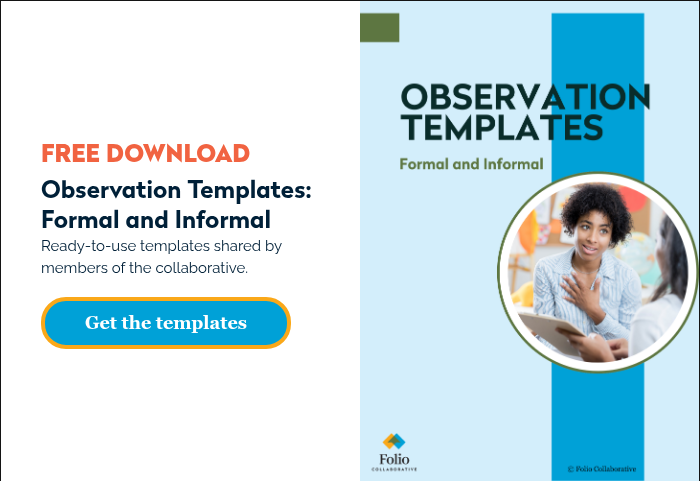Content for this piece comes from the October Folio Spark Session, 'Observation Best Practices.'
Maryvale Preparatory School, an independent Catholic school for girls in Maryland, embarked on a mission to evolve its faculty and staff observation system. Driven by a desire for a more holistic, regular, and supportive approach post-COVID, Dean of Faculty Carmen Sund spearheaded a transformation away from the traditional "got-you" model toward a system centered on coaching, reciprocal conversation, and mutual influence.
This case study outlines Maryvale's successful journey in implementing a comprehensive observation process—integrating both formal and informal methods—using the myFolio platform to foster a community of continuous professional growth.

I've been a friend of Folio since 2015-2016, when the Folio program was first developed. It was about finding a comprehensive professional development program that would really help center where all information could be accessed and entered about faculty, professional development, and also spotlight teachers and be a platform of conversation and coaching.
The Challenge: Moving Beyond Compliance
Before the overhaul, Maryvale's observation process was described as "not particularly strong" and relied heavily on a commendation recommendation format. This system was often perceived by faculty as a punitive exercise, requiring observers to find a "recommendation," which created an environment of wariness rather than support.
Carmen Sund, with her over 30 years in education and a renewed focus on coaching, was charged with developing a better model that aligned with the school's mission, fostered a safe environment for feedback, and promoted genuine professional development.
"I was trying to get away from [the 'got-you' way of observing] considering the nature of our community, the mission statement, what we hold dear."
Carmen Sund, Dean of Faculty
The Solution: A Three-Part Observation System
Maryvale implemented a new, holistic system for faculty and staff observations, structured around three core components:
☑️ Part 1: Pre-Observation Meeting and Document
The goal of this initial stage is transparency and shared expectations.
- For New Teachers: Required in both the fall and spring semesters.
- For Returning Teachers: The pre-observation meeting is optional, allowing them to submit a lesson plan or pre-observation form in advance instead, reducing unnecessary scheduling conflicts.
- Purpose: The pre-observation document, set up as a Note Template or self-reflection form in myFolio, communicates the teaching style and classroom environment to the observation team.
- The Team: The observation team initially included Carmen, the department chair, and an optional peer teacher. The team is evolving to include the division head and supervisor to make the process more personal and sustainable for Carmen.
☑️ Part 2: Formal and Informal Observations

Staff Observations: The observation process was extended to staff, using a separate rubric focused on three annual themes: community service, inclusion and belonging, and professional growth. This shifts the focus from classroom instruction to goal-aligned conversations.
Leveraging myFolio's Features: The Spotlight feature is used to showcase teacher and staff achievements and observations, creating a positive portfolio of success.
"The Spotlight feature in myFolio lets you spotlight teachers or staff members. It's wonderful, because on their page they can see all the information about their observation, but they also have the opportunity to see spotlighted events about what they have done and what people have observed about them. So it becomes really a portfolio of teacher success, or staff success."
Carmen Sund, Dean of Faculty
☑️ Part 3: Post-Observation Meeting and Reflection
This crucial step ensures feedback is reciprocal, clear, and leads to actionable growth.
- Goal: To have a face-to-face conversation about what was observed and experienced, allowing the observed party to reflect on and distill the information.
- Focus: Determining the next step in the professional development journey.
Outcomes and Institutional Impact
Since implementing the new system, Maryvale has seen a shift in its school culture:
1. Increased collaboration and openess. The informal, low-stakes "I Like, I Notice, I Wonder" observations have made teachers more welcoming to visitors, fostering an environment where teachers feel safe and supported.
2. Alignment of expectations. Transparency through shared rubrics and pre-observation documents ensures that school expectations are aligned with faculty practice.
3. Tracking and growth. All professional development requests and observation documentation are centralized in Folio, allowing for clear tracking and reflection. The school is even hosting a "gallery walk" of faculty and staff professional development experiences.
4. Sustainability. By involving multiple administrators and encouraging peer observation, the school is ensuring the process remains fresh and sustainable for long-serving faculty.
"It's made our community a lot more collaborative."
Carmen Sund, Dean of Faculty
Best Practices and Recommendations
Maryvale’s experience offers key insights for other schools seeking to evolve their observation systems:
1. Prioritize reciprocal conversation. Effective feedback involves mutual influence and conversation, not just a one-way critique.
2. Introduce informal drop-ins. Use a low-stakes model like "I Like, I Notice, I Wonder" for quick snapshots to capture authentic practice.
3. Foster teacher-to-teacher observation. Encourage faculty to observe colleagues (cross-divisional observations are highly beneficial) to foster a culture of learning and growth mindset.
4. Integrate myFolio time. Incorporate dedicated time during faculty meetings or PD days for teachers to discuss their goals and observations in the myFolio platform, preventing the process from feeling like "just one more thing."
CONTINUE YOUR LEARNING
Learn how Fordham Preparatory School leveraged collaboration, myFolio, and a focus on teacher strengths to create a sustainable and personalized PD program that empowers educators and improves student outcomes.


